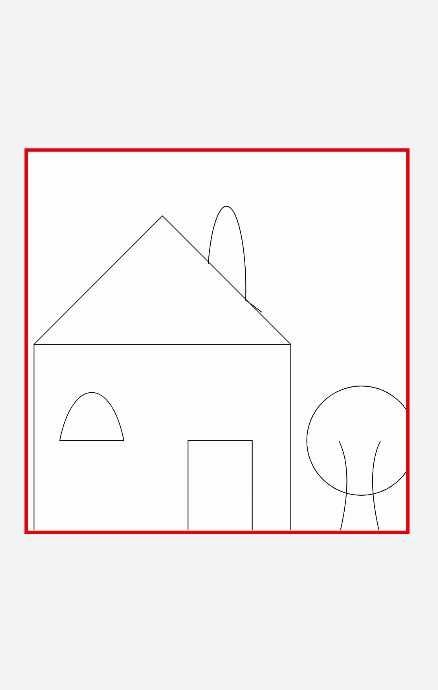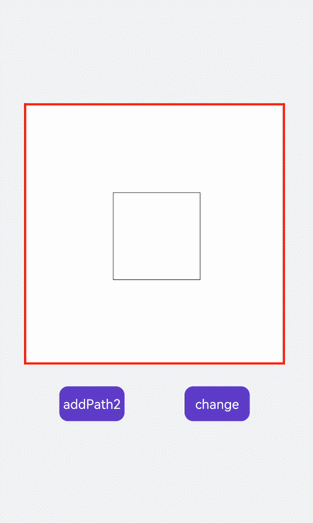Path2D
<Path2D> allows you to describe a path through an existing path. This path can be drawn through the stroke API of Canvas. For details, see Path2D.
Drawing Line Segments
Create a <Path2D> object and use line segments to create different shapes.
<!-- xxx.hml -->
<div class="container">
<canvas ref="canvas"></canvas>
</div>
/* xxx.css */
.container {
flex-direction: column;
background-color: #F1F3F5;
align-items: center;
justify-content: center;
width: 100%;
height: 100%;
}
canvas {
width: 600px;
height: 600px;
background-color: #fdfdfd;
border: 5px solid red;
}
// xxx.js
export default {
onShow() {
let ctx = this.$refs.canvas.getContext('2d', {
antialias: true
});
let path = ctx.createPath2D();
// Roof
path.moveTo(10, 300);
path.lineTo(210, 100);
path.lineTo(410, 300);
// House
path.moveTo(10, 300);
path.lineTo(410, 300);
path.lineTo(410, 600);
path.lineTo(10, 600);
path.closePath();
// Window
path.moveTo(50, 450);
path.bezierCurveTo(70, 350, 130, 350, 150, 450);
path.closePath();
// Door
path.moveTo(250, 450);
path.rect(250, 450, 100, 600);
path.closePath();
// Chimney
path.moveTo(365, 250);
path.ellipse(310, 215, 30, 130, 0, Math.PI * 0.04, Math.PI * 1.1, 1);
// Tree
path.moveTo(485, 450);
path.quadraticCurveTo(510, 500, 485, 600);
path.moveTo(550, 450);
path.quadraticCurveTo(525, 500, 550, 600);
path.moveTo(600, 535);
path.arc(520, 450, 85, 0, 6);
ctx.stroke(path);
}
}

Drawing Graphs
Use createPath2D to create a path object and draw only path1 so that only path1 is displayed on the canvas. Click the <text> component to trigger the addPath method. The path2 object is passed to path1 as a parameter. After the stroke operation is performed on the path1 object, path1 and path2 are displayed on the canvas. Click Change to change the value of setTransform to** setTransform(2, 0.1, 0.1, 2, 0,0)**. The graph is enlarged and tilted to the left.
<!-- xxx.hml -->
<div class="container">
<canvas ref="canvas"></canvas>
<div class="content">
<text onclick="addPath">{{ isAdd }}</text>
<text onclick="setTransform">{{ textName }}</text>
</div>
</div>
/* xxx.css */
.container {
flex-direction: column;
background-color: #F1F3F5;
align-items: center;
justify-content: center;
width: 100%;
height: 100%;
}
canvas {
width: 600px;
height: 600px;
background-color: #fdfdfd;
border: 5px solid red;
}
.content {
width: 80%;
margin-top: 50px;
margin-bottom: 50px;
display: flex;
flex-wrap: wrap;
justify-content: space-around;
}
text {
width: 150px;
height: 80px;
color: white;
border-radius: 20px;
text-align: center;
background-color: #6060e7;
margin-bottom: 30px;
}
// xxx.js
export default {
data: {
ctx: null,
path1: null,
path2: null,
path3: null,
isAdd: "addPath2",
isChange: true,
textName: 'change'
},
onShow() {
this.ctx = this.$refs.canvas.getContext('2d', {
antialias: true
});
this.path1 = this.ctx.createPath2D();
// Square
this.path1.moveTo(200, 200);
this.path1.lineTo(400, 200);
this.path1.lineTo(400, 400);
this.path1.lineTo(200, 400);
this.path1.closePath();
this.path2 = this.ctx.createPath2D();
// Arc
this.path2.arc(300, 300, 75, 0, 6.28);
this.ctx.stroke(this.path1);
},
addPath() {
if (this.isAdd == "addPath2") {
// Clear the content in the specified area on the canvas.
this.ctx.clearRect(0, 0, 600, 600);
this.ctx.beginPath();
// Add a path to the current path.
this.path2.addPath(this.path1);
this.ctx.stroke(this.path2);
this.isAdd = "clearPath2";
} else {
this.ctx.clearRect(0, 0, 600, 600);
this.ctx.stroke(this.path1);
this.isAdd = "addPath2";
}
},
setTransform() {
if (this.isChange) {
this.ctx.clearRect(0, 0, 600, 600);
this.path3 = this.ctx.createPath2D();
this.path3.arc(150, 150, 100, 0, 6.28);
// Reset and create a new transformation matrix.
this.path3.setTransform(2, 0.1, 0.1, 2, 0, 0);
this.ctx.stroke(this.path3);
this.isChange = !this.isChange;
this.textName = "back"
} else {
this.ctx.clearRect(0, 0, 600, 600);
this.path3.setTransform(0.5, -0.1, -0.1, 0.5, 0, 0);
this.ctx.stroke(this.path3);
this.isChange = !this.isChange;
this.textName = "change";
}
}
}
